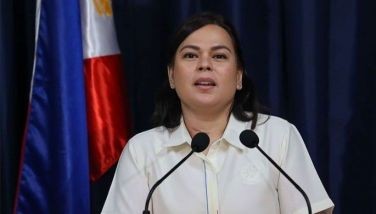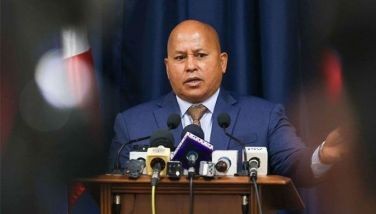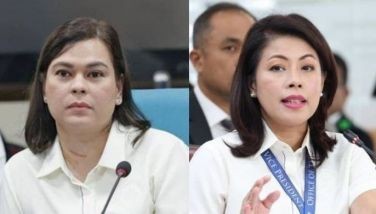Cojuangco repels gov’t move to take over SMC
April 21, 2004 | 12:00am
San Miguel Corp. (SMC) chairman and chief executive officer Eduardo "Danding" Cojuangco has fended off a government bid to seize control of the food and beverage giant.
The Presidential Commission on Good Government (PCGG) failed to persuade retail magnate Henry Sy Jr. to cast his vote in favor of the government during the organizational meeting following the election of board of directors yesterday.
At the meeting, the SMC board unanimously voted to retain Cojuangco at the helm of one of the Philippines’ biggest and best-run companies.
Sy, whose family owns the Philippines’ largest retail chain, SM, and controls or owns prime real estate in the country, was among the SMC directors who, along with representatives of Japan’s Kirin Brewery, backed Cojuangco.
Commenting on the retention of Cojuangco as SMC chairman, PCGG Chairman Haydee Yorac said: "Look, we said we’ll try for majority if we can, but if we can’t it’s fine as long as business is conducted regularly and is beneficial to the stockholders."
The PCGG, the state agency tasked to recover the alleged ill-gotten wealth of former President Ferdinand Marcos and his associates including Cojuangco, wanted to wrest control of SMC to protect the interest of the government.
The PCGG controls 27 percent of SMC shares which, along with the 20 percent held by Cojuangco, were supposedly acquired illegally during the Marcos regime using proceeds from a levy imposed on coconut farmers.
The stockholders’ meeting, however, went smoothly for the PCGG as it secured seats in the SMC board for its five nominees: former Presidential Security Group chief Leo Alvez, GMA-7’s Menardo Jimenez, former Nueva Ecija congressman and newly appointed Light Rail Transit Authority (LRTA) Administrator Pacifico Fajardo, banker O.V. Espiritu and businessman Igmidio Jose.
PCGG Commissioner William Dichoso said that as before, the government controls seven seats in the 15-member SMC board. The two other seats are occupied by the Government Service Insurance System (GSIS) and the Social Security System, represented by Winston Garcia and Corazon de la Paz, respectively.
Completing the 15-member board are SMC president and chief operating officer Ramon Ang, lawyer Estelito Mendoza, Manuel Cojuangco, Iñigo Zobel, Sy, and Kirin Brewery Co. Ltd. representatives Shigeki Ota and Hitoshi Oshima.
Dichoso said the PCGG had not bothered with the fight over the eight remaining seats of the other stockholders.
"Hindi na namin pinapakialaman yun. Basta kami, eh, binabantaan lang namin yung sa atin (We did not bother with it. We are only concerned about our own)," Dichoso told The STAR.
However, analysts say they favor Cojuangco staying on as the company’s chairman because of his success in turning SMC from a fledgling company into a money-maker.
Cojuangco was able to regain SMC’s key businesses like Coca-Cola Bottlers Philippines Inc. and acquire new ones, which have substantially contributed to the company’s bottomline, including Cosmos, Purefoods, Sugarland, Wilkins and J. Boag & Sons.
When Cojuangco took over SMC in 1998, the company had a net income of only P2.96 billion for 1997. Since then, the company has been generating an income in excess of P6 billion a year.
Last year, its income surged to P7.37 billion on sales of about P148 billion.
Cojuangco, who was also SMC chairman during the Marcos regime, lost the post in 1986 after Marcos fled to the US after a popular revolt, but regained it in 1998 when his political ally Joseph Estrada became president.
Since then SMC has embarked on an aggressive expansion in the Philippines, taking over major competitors to extend its dominance in the local market and boost group revenue.
SMC reported a 30 percent growth in net income during the first quarter of the year, driven by brisk beer sales in both the local and international markets.
Consolidated net sales revenue rose 15 percent to P39.02 billion as domestic and international beer sales combined increased 25 percent from January to March this year.
Operating income grew 33 percent to P3.43 billion over last year with the domestic beverage businesses, both alcohol and non-alcoholic segments, acting as the main growth drivers.
Significant income improvements were likewise achieved in the SMC Food Group. Corporate volume growth in real terms as of the first quarter is six percent above last year.
SMC is now reportedly pursuing a $500-million five-year plan to widen its market further in the Asia-Pacific region. — With Rainier Allan Ronda
The Presidential Commission on Good Government (PCGG) failed to persuade retail magnate Henry Sy Jr. to cast his vote in favor of the government during the organizational meeting following the election of board of directors yesterday.
At the meeting, the SMC board unanimously voted to retain Cojuangco at the helm of one of the Philippines’ biggest and best-run companies.
Sy, whose family owns the Philippines’ largest retail chain, SM, and controls or owns prime real estate in the country, was among the SMC directors who, along with representatives of Japan’s Kirin Brewery, backed Cojuangco.
Commenting on the retention of Cojuangco as SMC chairman, PCGG Chairman Haydee Yorac said: "Look, we said we’ll try for majority if we can, but if we can’t it’s fine as long as business is conducted regularly and is beneficial to the stockholders."
The PCGG, the state agency tasked to recover the alleged ill-gotten wealth of former President Ferdinand Marcos and his associates including Cojuangco, wanted to wrest control of SMC to protect the interest of the government.
The PCGG controls 27 percent of SMC shares which, along with the 20 percent held by Cojuangco, were supposedly acquired illegally during the Marcos regime using proceeds from a levy imposed on coconut farmers.
The stockholders’ meeting, however, went smoothly for the PCGG as it secured seats in the SMC board for its five nominees: former Presidential Security Group chief Leo Alvez, GMA-7’s Menardo Jimenez, former Nueva Ecija congressman and newly appointed Light Rail Transit Authority (LRTA) Administrator Pacifico Fajardo, banker O.V. Espiritu and businessman Igmidio Jose.
PCGG Commissioner William Dichoso said that as before, the government controls seven seats in the 15-member SMC board. The two other seats are occupied by the Government Service Insurance System (GSIS) and the Social Security System, represented by Winston Garcia and Corazon de la Paz, respectively.
Completing the 15-member board are SMC president and chief operating officer Ramon Ang, lawyer Estelito Mendoza, Manuel Cojuangco, Iñigo Zobel, Sy, and Kirin Brewery Co. Ltd. representatives Shigeki Ota and Hitoshi Oshima.
Dichoso said the PCGG had not bothered with the fight over the eight remaining seats of the other stockholders.
"Hindi na namin pinapakialaman yun. Basta kami, eh, binabantaan lang namin yung sa atin (We did not bother with it. We are only concerned about our own)," Dichoso told The STAR.
However, analysts say they favor Cojuangco staying on as the company’s chairman because of his success in turning SMC from a fledgling company into a money-maker.
Cojuangco was able to regain SMC’s key businesses like Coca-Cola Bottlers Philippines Inc. and acquire new ones, which have substantially contributed to the company’s bottomline, including Cosmos, Purefoods, Sugarland, Wilkins and J. Boag & Sons.
When Cojuangco took over SMC in 1998, the company had a net income of only P2.96 billion for 1997. Since then, the company has been generating an income in excess of P6 billion a year.
Last year, its income surged to P7.37 billion on sales of about P148 billion.
Cojuangco, who was also SMC chairman during the Marcos regime, lost the post in 1986 after Marcos fled to the US after a popular revolt, but regained it in 1998 when his political ally Joseph Estrada became president.
Since then SMC has embarked on an aggressive expansion in the Philippines, taking over major competitors to extend its dominance in the local market and boost group revenue.
SMC reported a 30 percent growth in net income during the first quarter of the year, driven by brisk beer sales in both the local and international markets.
Consolidated net sales revenue rose 15 percent to P39.02 billion as domestic and international beer sales combined increased 25 percent from January to March this year.
Operating income grew 33 percent to P3.43 billion over last year with the domestic beverage businesses, both alcohol and non-alcoholic segments, acting as the main growth drivers.
Significant income improvements were likewise achieved in the SMC Food Group. Corporate volume growth in real terms as of the first quarter is six percent above last year.
SMC is now reportedly pursuing a $500-million five-year plan to widen its market further in the Asia-Pacific region. — With Rainier Allan Ronda
BrandSpace Articles
<
>
- Latest
- Trending
Trending
Latest
Trending
Latest
Recommended
































